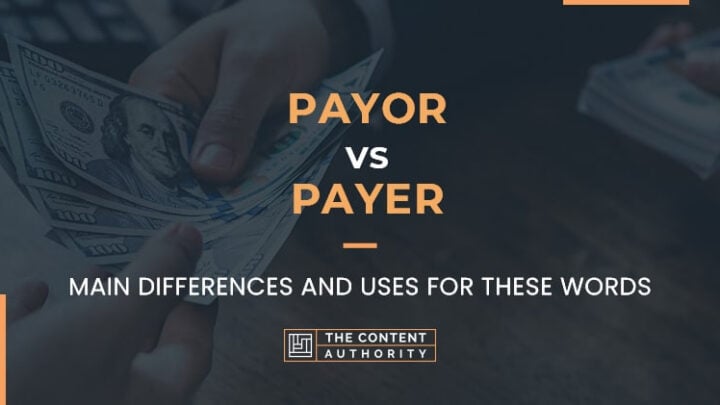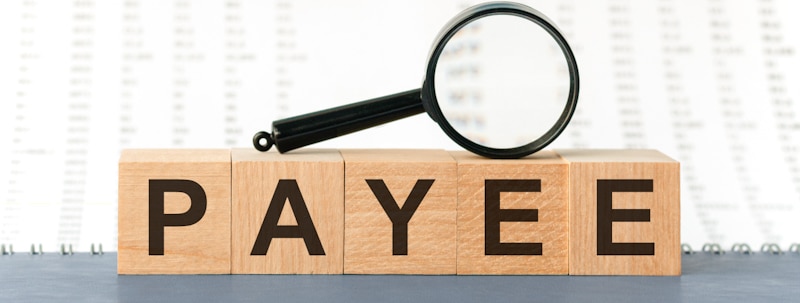When there is a money transaction, we can use two words to name the person who gives the money to another person or entity. In some text, we can find the word “payor” as the responsible for paying, but we can also find the term “payer” with the same meaning. However, there seems to be a difference between these two terms.
Payer and payor refer to the person who gives the money in exchange for goods or services. According to most dictionaries, there is no difference between these two terms. Still, a payor is a less common variant form, primarily used in a legal context, while payer is the preferred spelling in everyday language.
In this sense, both words are correct, and they can be interchangeable. Let’s take a closer look at the definition of payer and payor and the uses of these words. We will also explore examples of each term and explain how we form nouns in modern English.

What Does Payer Mean?
A payer is a noun that names the person who gives money due for work done, goods received, or incurred debt. For example, an employer is a payer when buying new equipment for the office. The employer also becomes a payer when issuing paychecks to public employees. Let’s examine some examples of situations involving a payer:
- A few months ago, the cooking gas system in my house collapsed. We had a propane gas leak at home, and I called the propane supplier to report the leak. When the plumber finished working, I wrote him a check to pay for his services. In this case, I am the payer.
- Gustavo is in charge of paying the Internet and general house bills. He pays every month through a money transfer which makes him a payer.
- My friend Claudia went to the real-estate agency and purchased a new apartment. She is the payer.
- I owe the bank 30000 dollars, and I write a paycheck every month to pay off the debt. I am a payer, and the bank is the payee.
- Ana is a freelance photographer. She sells her photos online. When someone purchases her pictures, that person becomes the payer.
- John did not pay for parking at the hotel and received a parking violation ticket on his car. He is required to pay $80 for parking illegally. He was furious about it and paid the $80 ticket. John is the payer.
- Julie uses her bicycle every day to move around the city. Last week she had a flat tire and took her bike to the bike shop for repairs. She paid the bike shop $10 for the flat tire repair. Julie was the payer.
- The payer came to my house to write me a check, but I told him that I could not accept payments via check.
- I am learning to be an excellent payer to avoid going into debt.
- To get financial benefits, the payer needs to show bank account records.
- You can trust my friend Oscar and lend him money. Oscar is a good payer.
Etymology
The word payer is a Middle English noun dating back to 1325-75. The first known use of the term was in the 14th century. It is a combination between the verb pay, which is an interchange of money or goods to discharge a debt or obligation, and the suffix -er, used in regular English to form nouns. Its origin comes from Old French “paier,” from Medieval Latin “pacare” (“to settle, satisfy”) from Latin paco, pacare (“make peaceful, pacify, quiet, soothe; subdue”), from pax (“peace”).
What Does Payor Mean?
It is the person who pays and the maker of payment, usually in healthcare, legal and medical insurance. It is not a common spelling of the word payer, but some people may use it as synonyms. If you do a Google search for the word payor, most of the results are legal or medical websites and dictionaries, which may hint that this form of spelling is mostly used in a legal/healthcare context. Here are some uses of the word payor in sentences:
- A payor can make a written promise to pay a debt at a future date within a legal context. This is called a promissory note. We can see this situation when you make agreements with a company you had a service with and didn’t pay on time. You sign a promissory note so you can pay a certain amount promptly.
- Eve had a credit card with an unlimited balance but failed to pay on time. She agreed with her bank, and she has to pay $40 monthly. Eve is the payor, and the bank is the payee.
- .Health insurance companies become the primary payor for the costs of medications.
- A third-party payor is an entity that pays medical claims such as government agencies, insurance companies, or health maintenance organizations.
- Freelancers are payors. They need to report their incomes every year and, based on this information, pay taxes.
- The government decides the amount that the payor parent pays for child support.
- The third-party payor reimburses my expenses at the pharmacy.
- Medicare and Medicaid are common third-party payors in the USA.
- Maria will get her tonsils removed next month, but the cost of paying is often high. She will rely on a third-party payor to cover the expenses.
- How much is child support in Texas if the payor earns under 150k?
- He would like to negotiate a payor agreement with the bank.
- It is mandatory to sign the contract in the payor’s presence.
- The government collects tax returns from payors. However, they can also become payors when there is an overpayment of tax, so they issue refunds to the payee.
Rules For Noun Formation From Verbs
There are rules of noun formation in modern English, and words such as payer or payor are formed from verbs (the verb to pay). It is known that the prefix -or is used in classical and post-classical Latin nouns to create nouns. Therefore, it is valid that pay (or) exists because it makes sense to add the prefix -or to the verb pay. However, we know that there are always exceptions to rules, and it is more complex than adding a simple -or at the end of a verb.
For instance, the -or ending is preferred but not exclusive within a legal or medical context. However, when the noun expresses an agent, the -er prefix is preferable and more common. According to our searches in modern English, we can only add the suffix -or to words derived from Latin; however, it is not easy to identify them.
Some other examples of nouns made from adding -er or -or ending to name a person or thing that does something:
- Build – Builder
- Pray-Prayer
- Play-Player
- Teach-Teacher
- Work-Worker
- Survive-Survivor
- Edit-Editor
- Sail-Sailor
- Visit-Visitor
To summarize
Word formation in modern English can be complicated because there can be different rules and exceptions you can guide from. Sometimes, we use common sense when spelling a word because it sounds familiar, like little children usually do when learning how to speak. The term payor with the -or prefix seems to be the correct way to spell it because it is reasonable to assume that the verb pay to become a noun should have the prefix -or. However, in this scenario, -er is the preferable suffix because it is the most commonly found in texts and reliable websites.
Shawn Manaher is the founder and CEO of The Content Authority. He’s one part content manager, one part writing ninja organizer, and two parts leader of top content creators. You don’t even want to know what he calls pancakes.


